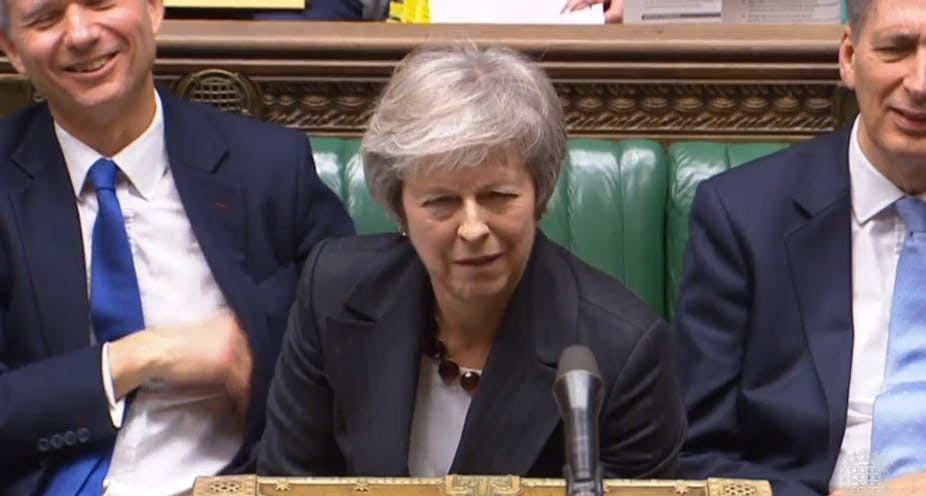When in that House MPs divide, If they’ve a brain and cerebellum too They have to leave that brain outside And vote just as their leaders tell ‘em to.
So, at least, thought Private Willis in Gilbert and Sullivan’s comic opera Iolanthe, first performed in 1882. We have become used to the idea that when MPs vote in parliament, they do as their party whips dictate, unless they are prepared to face the consequences of rebelling.
But while it may seem like a huge gamble, allowing MPs to vote their own way on the Brexit deal might offer Theresa May a way out of what appears to be an impasse. As things currently stand, the prime minister faces rebellion from a significant number of her own MPs – including members of the government – if she tries to whip them into supporting her deal. That makes it very hard to see how she could get her deal through a parliamentary vote.
MPs have not always been whipped to vote as their leaders dictate but free votes are the exception rather than the rule these days. As a Conservative Research Department publication in 1971 explained:
[The] normal practice in this country is for the government of the day to ask its supporters through the whips to support it on the major policies which it has recommended to parliament … A free vote is normally reserved for matters which do not form an integral part of the government’s central strategy so that the policy of the government as a whole is not greatly affected.
There have only been three free votes since May became prime minister. As these concerned building work on parliament they were, however, strictly speaking about parliamentary rather than government matters.
Labour governments between 1997 and 2010 offered their backbenchers 131 free votes. This figure sounds impressive, but in reality most of these votes were on three subjects: hunting with dogs; the Human Fertilisation and Embryology Bill; and House of Lords reform. Free votes were used on these to contain internal tensions in the governing party and to reflect the conscientious objections of Catholic MPs on the embryology issue. The free vote was thus used as a means of managing the parliamentary party. New Labour governments had large majorities and could use the device because, although these were controversial issues which mattered a lot to some of their MPs, they did not matter to the survival or otherwise of the government.
An important precedent
The idea being bandied about that May should offer a free vote on her Brexit deal is a very different proposition. This matter is, after all, central to the very existence of her government. A free vote would therefore appear to be, for both her and her chief whip, Julian Smith, a potentially risky strategy. It is easy to see why those in her party who dislike her deal are keen for a free vote, particularly if they do not want to give up the emoluments of office when voting against their own leader’s policy. It is less clear why May should indulge their wishes.

Yet it has been pointed out that there is a precedent, also on a European matter central to the policies of a Tory government. On October 28 1971 a debate that began a week earlier on the principle of Britain joining the then European Economic Community ended with Conservative MPs having a free vote on the issue. The initiative for this did not come from the europhile prime minister, Ted Heath, but from a backbench eurosceptic, Derek Walker-Smith. There were nonetheless a number of reasons why Heath acceded to the demand, all of which might appeal to the current prime minister.
First, Heath did not want to hold a referendum on his deal any more than May does now. The free vote was, for Heath, a way of holding a full debate and having a meaningful vote, without the outcome seeming to be imposed by his government. It centred attention instead on parliament as a decision-making body.
It also enabled Tory objectors like Walker-Smith to vote against the government, safe in the knowledge that a free vote cannot be treated as a vote of no confidence, so they could vote with their conscience without fear of the consequences. Finally, it encouraged a good number of Labour pro-marketeers to vote with the government, defying their own party’s three-line whip. Heath was thus able to secure an impressive majority of 356 to 244 in the vote.
To these points might be added the observation that you cannot rebel against a free vote, so such a concession would draw the sting of the various bands of Tory malcontents.
The analogies are not exact. For instance, how Labour MPs would vote in 1971 was more predictable in 1971 than is the case now. Most importantly, Heath did not allow members of the government a free vote, whereas these are the people seemingly most vociferous in demanding one now. An exact copy of his model, allowing a free vote for some Tory MPs but not for others, could thus simply prompt more Cabinet resignations. Nonetheless, the 1971 approach might still suggest a tempting way for May to address her current parliamentary difficulties.

